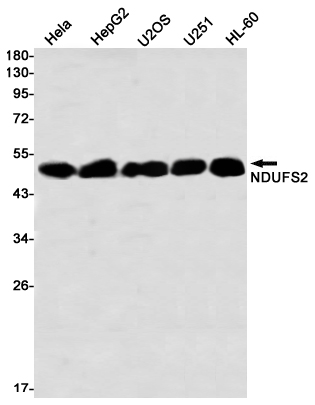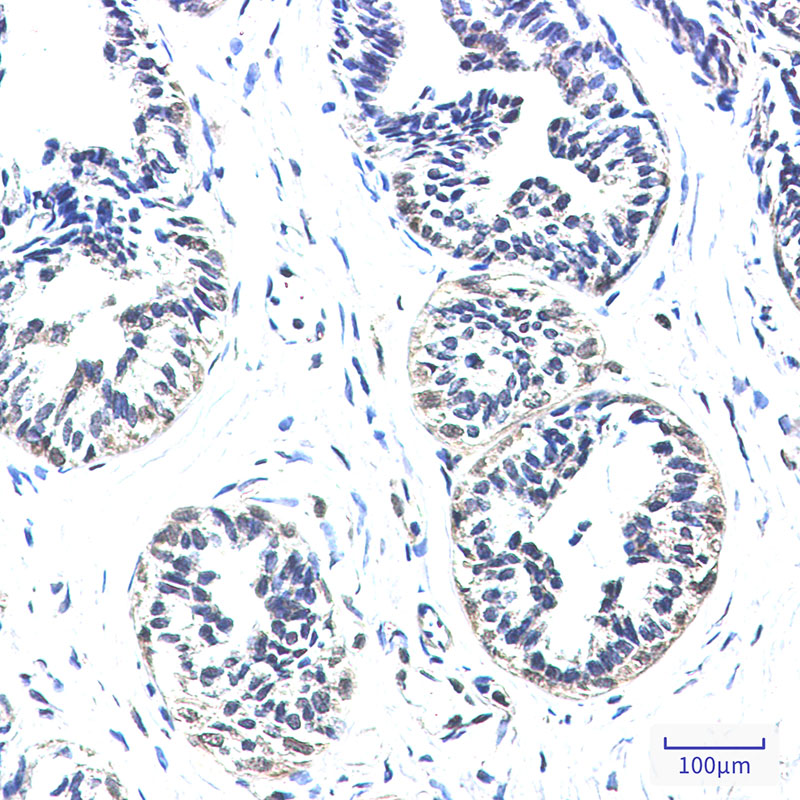

| WB | 1/500-1/1000 | Human,Mouse,Rat |
| IF | 1/20 | Human,Mouse,Rat |
| IHC | 1/50-1/100 | Human,Mouse,Rat |
| ICC | 技术咨询 | Human,Mouse,Rat |
| FCM | 咨询技术 | Human,Mouse,Rat |
| Elisa | 咨询技术 | Human,Mouse,Rat |
| Aliases | NADH dehydrogenase (ubiquinone) Fe-S protein 2; 49kDa; CI-49 |
| Entrez GeneID | 4720 |
| WB Predicted band size | Calculated MW: 53 kDa; Observed MW: 49 kDa |
| Host/Isotype | Rabbit IgG |
| Antibody Type | Primary antibody |
| Storage | Store at 4°C short term. Aliquot and store at -20°C long term. Avoid freeze/thaw cycles. |
| Species Reactivity | Human |
| Immunogen | Recombinant protein of human NDUFS2 |
| Formulation | Purified antibody in TBS with 0.05% sodium azide,0.05%BSA and 50% glycerol. |
+ +
以下是3篇与NDUFS2抗体相关的文献概览(人工总结摘要内容):
1. **《Mitochondrial complex I deficiency caused by NDUFS2 mutations》**
- 作者:Janssen RJ, et al.
- 摘要:研究利用NDUFS2抗体检测线粒体复合体I亚基表达,发现NDUFS2基因突变导致复合体I组装缺陷,与儿童脑肌病相关,证实抗体在诊断线粒体疾病中的应用价值。
2. **《NDUFS2 overexpression promotes colorectal cancer progression by regulating mitochondrial apoptosis》**
- 作者:Chen L, et al.
- 摘要:通过NDUFS2抗体免疫组化分析结直肠癌组织,发现NDUFS2高表达抑制线粒体凋亡通路,促进肿瘤侵袭,提示其作为癌症治疗潜在靶点。
3. **《Antibody-based profiling of mitochondrial respiratory chain complexes in Parkinson's disease》**
- 作者:Swerdlow RH, et al.
- 摘要:使用NDUFS2等复合体I特异性抗体检测帕金森患者脑组织,发现复合体I亚基表达显著降低,支持线粒体功能障碍在神经退行性疾病中的作用机制。
注:若需获取全文,建议通过PubMed(PMID: 16376865/类似编号)或期刊官网查询具体文献。实际研究中建议优先选择近5年高影响因子期刊论文。
The NDUFS2 antibody is a crucial tool for studying the NADH:ubiquinone oxidoreductase core subunit S2 (NDUFS2), a key component of mitochondrial Complex I in the electron transport chain. Complex I, the largest enzyme in oxidative phosphorylation, catalyzes NADH oxidation and ubiquinone reduction, contributing to ATP synthesis. NDUFS2 is an essential structural and functional subunit located in the core of Complex I, playing a role in electron transfer and enzyme assembly. Mutations or dysregulation of NDUFS2 are linked to mitochondrial disorders, such as Leigh syndrome, and neurodegenerative diseases like Parkinson’s, as well as cancer progression due to metabolic reprogramming.
NDUFS2 antibodies are widely used in research to detect protein expression, localization, and stability via techniques like Western blotting, immunohistochemistry (IHC), and immunofluorescence (IF). These antibodies help elucidate the molecular mechanisms of mitochondrial dysfunction, assess Complex I deficiencies in patient samples, and validate gene-editing or therapeutic interventions in disease models. Species specificity (e.g., human, mouse, rat) and validation in knock-out controls are critical for ensuring antibody reliability. By enabling precise analysis of NDUFS2. these antibodies advance our understanding of mitochondrial biology, cellular energy metabolism, and their roles in disease pathogenesis.
×